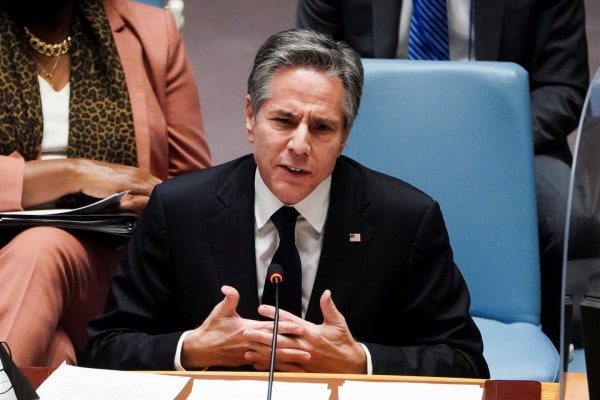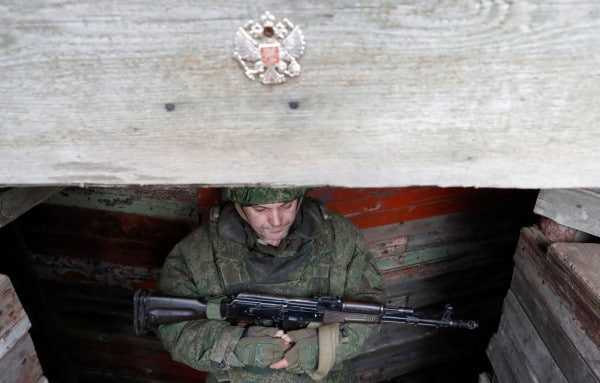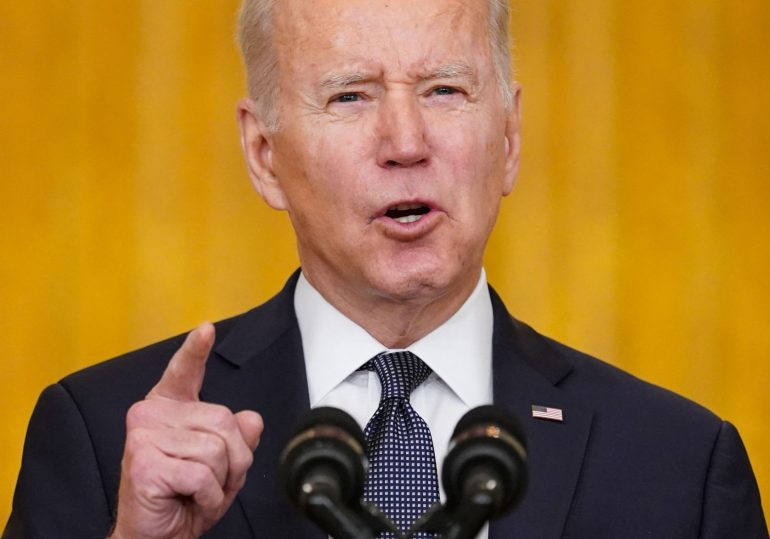Despite the signs of compromise tones, the high tones in relation to Ukraine are back again
Although it appeared that after moves such as the Biden-Putin conversation, the Lavrov-Putin public debate, the Soltz's visit to Ukraine and Russia, the Biden discourse, the announcement that a partial withdrawal of Russian forces from the border areas was beginning with Ukraine, that we are entering a phase where diplomacy has the first say, in recent days the high tones for the Ukrainian have returned.
The initiative was taken mainly by the US and NATO, which directly challenged the Russian announcements for the start of the withdrawal process of a part of the Russian forces and reiterated the position - through Joe Biden - that a Russian invasion of Ukraine was imminent.
This led to a new communication storm with the subject of the impending Russian attack, although this time without specifying a date, as was done in the previous phase of tension, along with the resumption of scenarios that Russia will "direct" an episode that will gives the typical pretext to invade.
Russia insists that no invasion is imminent and reiterates its proposals for collective security
In response, Russian government officials have insisted that no invasion is imminent and have denied the allegations made by NATO and US officials.
At the same time, Russia has made public its response to US proposals on collective security issues in Europe.
Russia says the US response has been unsatisfactory, as it does not include commitments not to further expand NATO, to prevent Ukraine and Georgia from entering the country, and not to build military bases in non-USSR countries. and overall the return of NATO military infrastructure to where it was in 1997.
The response rejects the ultimatums for the withdrawal of Russian forces and states that the US position does not stand on the Russian request for a "package-talk" while ignoring the sovereign rights of Russia and its security concerns.
The answer to this question is that in the absence of a US will to reach a binding agreement on security issues, Russia will respond, including by implementing "military-technical measures".
Russia denies annexing Crimea and says that if Ukraine joins NATO, Kiev may want to retake Crimea, and that risks dragging the United States and its allies into an armed confrontation with Russia.
In connection with the Ukrainian crisis, Russia denies that it triggered the conflict in Donbas and that this is an internal conflict in Ukraine that can be addressed through the implementation of the Minsk Agreements, which sets out specific dialogue procedures and recognizes the Donetsk representatives as interlocutors. of Lugansk.
In addition, the Russian response accuses the US of not referring to the principle of indivisible security, although it has accepted it in a series of joint declarations. He points out that NATO's "open door policy" is at odds with NATO's own statements in the 1990s about avoiding unilateral action.
On the other hand, the response indicates - as Putin did in his statements - that there are proposals to control armaments and recognize the correctness of Russia's relevant positions. At the same time, however, the answer points out that the United States does not understand the "proposal-package" nature of the Russian proposals. 
The battle for control of the narrative
If one observes the asymmetry between the positions, with the US and NATO focusing on the issue of an impending invasion of Ukraine as what should be of concern to the international community and the Russian position that what should be discussed is the security situation in Europe, can understand both the dispute and the intensity of the current controversy.
It is clear that the US is moving towards the perception that Russia is a threat (especially in conjunction with an Eurasian integration) that can be tackled by putting maximum pressure on it to change its overall orientation and by then Consider expanding NATO to form a kind of "health zone" vis-.-vis Russia.
In this context, it is crucial for the United States to establish in the global public sphere that Russia today is an offensive and destabilizing force, which, if necessary, can be sanctioned and against which states that feel threatened can apply to become members. of NATO.
This explains why at this stage the US and its allies are likely to escalate this political and communication pressure rather than go on a line of de-escalation and dialogue. This is exacerbated by the fact that the US seems to have largely "controlled the narrative" and is now being discussed mainly on its own terms, ie around an invasion of Ukraine, which Russia denies, and more generally in terms of a "Russian threat". . In an advanced version, this move would even seek to impose sanctions without intrusion, simply on the basis of the "threat" criterion. Marginally some of the positions seem to seek an armed conflict in Ukraine to make it easier to impose very severe sanctions on Russia.
Russia, for its part, is trying to move beyond its own position on a comprehensive reassessment of collective security in Europe, returning to a security perception of the 1990s and emphasizing the possibility of restricting the expansion of military coalitions and weapons systems, alongside a strong sense of sovereignty.
He tries to combine this position with the prevention of crimes committed in Ukraine, through the "show of force" in Kiev in terms of the consequences of any violation of the Russian "red lines", while emphasizing that there is a way out through the implementation of the Minsk Agreements.
So far, Russia seems to be finding opportunities to talk about these issues more with the Europeans than with the United States (although Blinken has repeatedly referred to the Minsk Agreements as the process for discussing the Ukrainian crisis). However, overall, it has not been able to define the terms of the debate and, above all, it has been able to secure its main demand, which is to have its own concerns heard as an equal "superpower".
At the same time, Russia itself, having "raised the bar" and the stakes on its part and having this kind of political-communication strategy towards it, has found itself at a point where it is not easy to define a fold that will not be presented as " retreat ", at the same time that it encounters the systematic questioning of its intentions. 
The asymmetric terms of a confrontational strategy
All this points to an asymmetry in how the two sides deal with the conflict. It is clear that the real issue is not Ukraine but the correlation of power and the architecture of the international arena. Russia proposes a model of balance and mutual respect for peace, dating back to the Cold War and the first post-Cold War era. The United States, or at least a significant portion of its diplomatic and military establishment, believes that the best architecture right now is to expand the alliances that define the West and to put constant pressure on "authoritarian governments" to accept this treaty - which is usually the case. involves legitimately invoking issues such as democracy or human rights - and seeing their relative power or influence diminish.
The problem is that the more this debate turns into dialogue and negotiation, albeit difficult and tough, about collective security, balances and rules in the international landscape, the greater the risk that the debate will become "practical" around an existing one. international crisis, such as the Ukrainian. Only history has shown that when more comprehensive correlations and contrasts burden individual regional crises, the result is usually escalation rather than de-escalation.
in.gr
